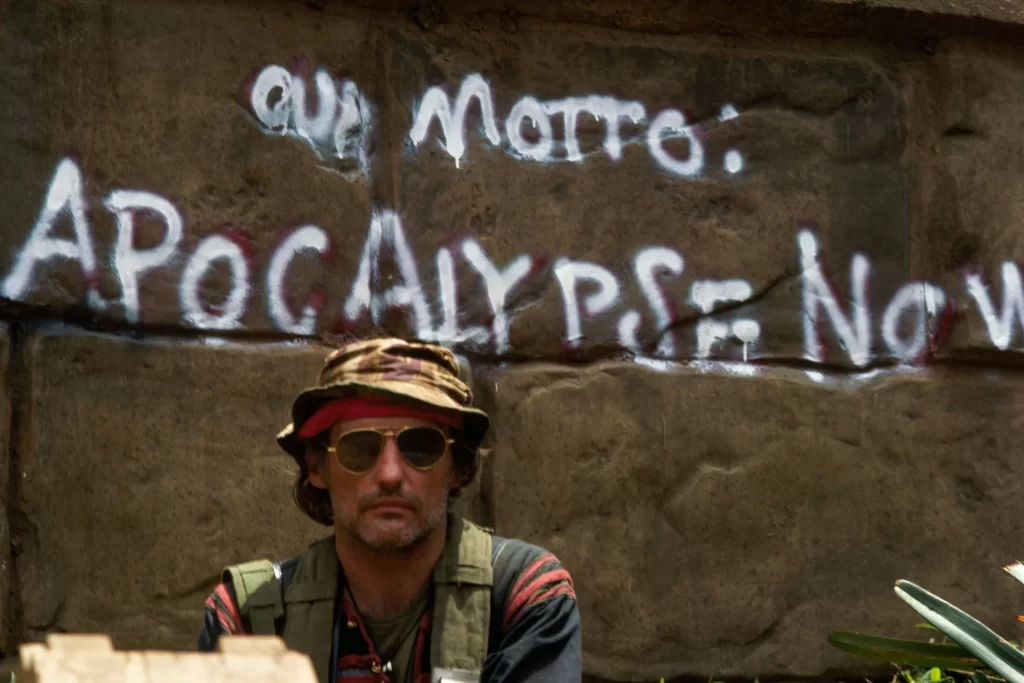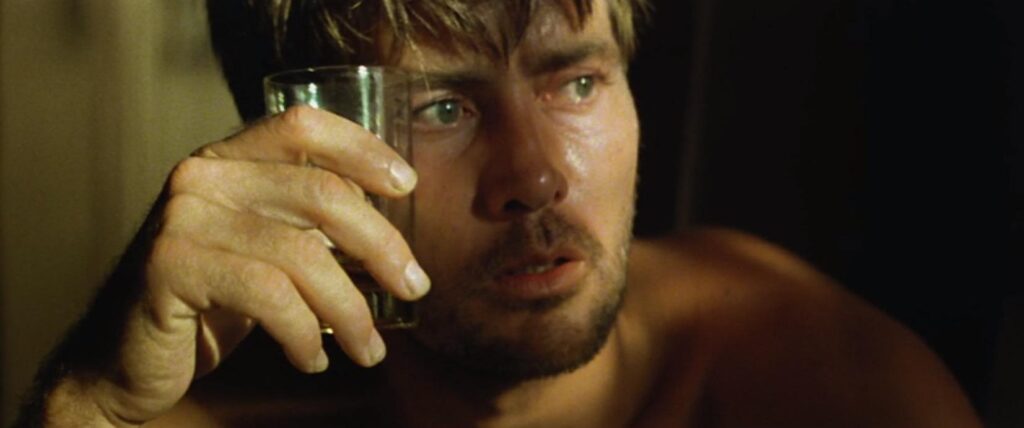
Released in theaters on this date, 44 years ago.
Anyone out there who has not seen this movie? Anyone who hasn’t seen it several times? Like most masterpieces, nothing can replace the feelings (ranging from awe to confusion) that accompany a first viewing; like all masterpieces, it demands to be revisited, equal parts homage and assignation (Much more on this peculiar compulsion, here). Like only the rarest of masterpieces, the central themes and takeaways are consistent, but the piece of art assumes layers and nuances that reflect (and comment upon) where and who the viewer is.
My “hot take” from a 2016 celebration of The Deer Hunter and its director Michael Cimino: Apocalypse Now was always imperfect, and, in ways no one could have anticipated; its very messiness, inscrutability, and shoehorned ending only gain stature as the perfect metaphor for the imperfect fiasco that was Vietnam.
Every so often an article or, these days, a Tweet, will enlighten or remind fans that the epic opening scene includes actual footage from a drunken meltdown, and what ends up on screen could not be more meta. (If you consider yourself a fan of this film and have not seen the documentary Hearts of Darkness, consider this a gentle admonition. Oh, and you’ve never read Joseph Conrad’s Heart of Darkness, check it out and gain a fuller appreciation of ways the movie did –and didn’t– work with that text, and also be enlightened or reminded that “the horror” has always been with us).
Among the many things you’ll learn, watching this documentary, is what a miracle it is it ever got completed. The lion’s (or tiger’s?) share of credit, of course, must go to director Francis Ford Coppola. It’s always instructive to take a step back and try to wrap one’s mind around how much he achieved during the ’70s. In addition to both Godfather films, he wrote and directed The Conversation, and then wrote the screenplay for the remake of The Great Gatsby. Four of the most beloved films in cinema history (all four of them could conceivably be included in any Top 10) and a rewrite of the great American novel. What did you do during the last 10 years?
Other things you’ll be amazed (or amused, or appalled) to know: Martin Sheen actually suffered a heart attack, on set. Coppola lied about the severity of this crisis, worrying (not without reason) that the financiers would shut down production. Also: Harvey Keitel was, inconceivably, originally cast for the role of Captain Willard, and was on set for several weeks before inevitably being fired. On one hand, it’s impossible to imagine anyone doing a better job –for any number of reasons, one of them being we now know Sheen was effectively playing himself– it’s amazing (or amusing or appalling) to consider how spectacularly ill-suited Keitel (fresh off of Taxi Driver!) must have been. Brando was not supposed to be bald or fat. And he hadn’t read the book, apparently the only requirement Coppola had before guaranteeing his obscene salary. And he refused to learn his lines. Laurence Fishburne was a teenager (!) and Dennis Hopper was not acting (!!). Finally, it seems impossible to imagine, but The Doors were not the ubiquitous cultural icons they became, and Coppola’s inclusion of “The End” helped generate renewed enthusiasm. Also, he managed to procure footage to the uncorrupted version of “The End,” which of course was edited for the original album release in 1967. That’s not an alternate take: if you listen to the original album version you can hear they just turn Morrison’s vulgarities way down in the mix.

As it happens, many famous faces from the film are no longer with us, including, of course, Marlon Brando and Dennis Hopper, and Frederic Forest, who passed earlier this summer. Below is my appreciation of him and his once-in-a-lifetime performance as Chef.
Frederic Forrest: RIP, Chef (June 28, 2023)
If you’re a fan of Francis Ford Coppola, you are familiar with Frederic Forrest.
If you’re an ardent fan of Francis Ford Coppola, you appreciate the rare gifts Frederic Forrest left us, forever.
An excellent overview of his life and career, courtesy of The Washington Post, here.
He’s ideally cast as the ambiguous bureaucrat in FC’s masterpiece The Conversation (my appreciation of that film, which I consider one of the best of the ’70s, here). He received an Oscar nomination for his role in The Rose, and was in dozens of films, ranging from memorable to unforgettable.
Of course, his finest work –and some of the best work anyone has done embodying a role– came in Coppola’s uncategorizable tour de force Apocalypse Now. The entire supporting cast is stellar, and while Laurence Fishburne and Sam Bottoms nail their wide-eyed kids (one from the east coast ghetto; the other fresh from the California surf), Forrest’s Chef is a much more complex, troubled character. One layer of tragedy he conveys is that he’s not “merely” another person whose life is wasted in a useless, unwinnable war sold on lies, it’s that we understand he could, and would, be doing something meaningful, in a kitchen, had he never been abruptly uprooted and forced thousands of miles from New Orleans. Forrest is remarkable throughout, but at least two of his scenes are indelible, both utilizing the “show don’t tell” strategy (which, admittedly, film can handle more readily than fiction) to illustrate the ways war’s insanity shatters more sensitive soldiers.
My poem “Chef’s Second Chance” (which appears in my collection The Blackened Blues) is (of course) a tribute to the character from Apocalypse Now (but also –and I’ll keep the editorializing brief– a commentary on veterans of America’s wars and how, for the last half century, they’ve been asked for much and provided very little. More, this poem represents, for me, what creative writing can do that even the best political non-fiction can’t; too many people are simply tuned out to opinion, or are set in their views so that even the most compelling insights can’t get past the carefully constructed shell; with a poem you have a chance to make points without preaching, inhabit other realities without presuming, and exhibit empathy that might, one prays, be contagious).
Chef’s Second Chance
“Never get out of the boat.”
–Chef, Apocalypse Now
It never sat well that Chef, who endured so much
in the service of a suicide mission, found himself
smuggled as he slept, then sacrificed like a lamb shank—
collateral damage to the apocalyptic designs of Col Kurtz,
exterminating men with the carelessness of cooks, stewing
marbled meat until it sluggishly turns the color of steel pots.
So let’s suppose, in a slightly less insane sort of world,
Chef gets a second chance. Stateside, run through the jungle
and back in his kitchen, taking orders even he can understand.
Ponytail in place, primed gently by grill grease and sweat,
a different cauldron altogether, head counts & tickets clocked
one plate at a time: straight wages for sensible work.
Except something is off: he can’t break away from this place.
Not the job, but that unconquered country and the things he carries.
It couldn’t break his will but it’s slowly sucking on his soul,
his brain boiling with all he saw and can never not see.
The more he scrubs the less he shines (Mistah Clean—he dead).
Darkness stalking his heart, murdered babies beneath his boots.
Too many jobs lost to count, he’s changed but nothing else did.
A survivor but nobody warned him about no shit like this:
His sins can’t be forgiven. Fortunate sons smirk when he stands
at the bus stop, nowhere to go, no way to pay, so of course
cops come when he breaks down inside that bank, not trying
to hurt anyone, there’s no gooks here and the gun’s not even loaded.
(Over there I could empty a clip and get myself a medal;
ain’t this a motherfuck! Five-to-ten for unlawful entry?)
So here you are. Came all this way and you finally get it.
Maybe you should have gotten your ass out of that boat.
The tiger was God trying to tell you a thing or two—too late,
you’ll never know now—or else on a mission of its own:
finding you, afraid but still on your feet, some instinct
sending it up river to put you, at last, out of your misery.
